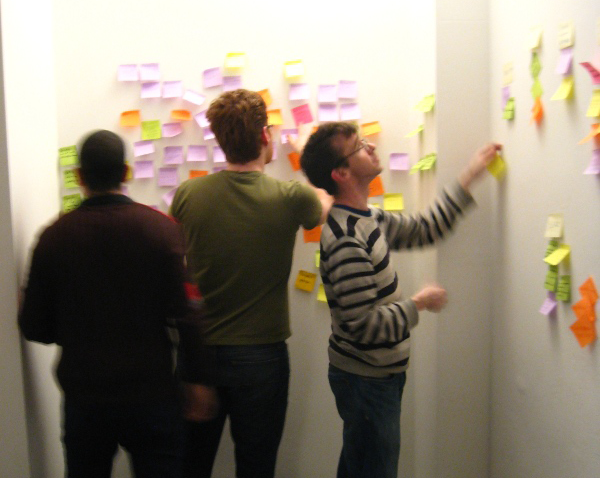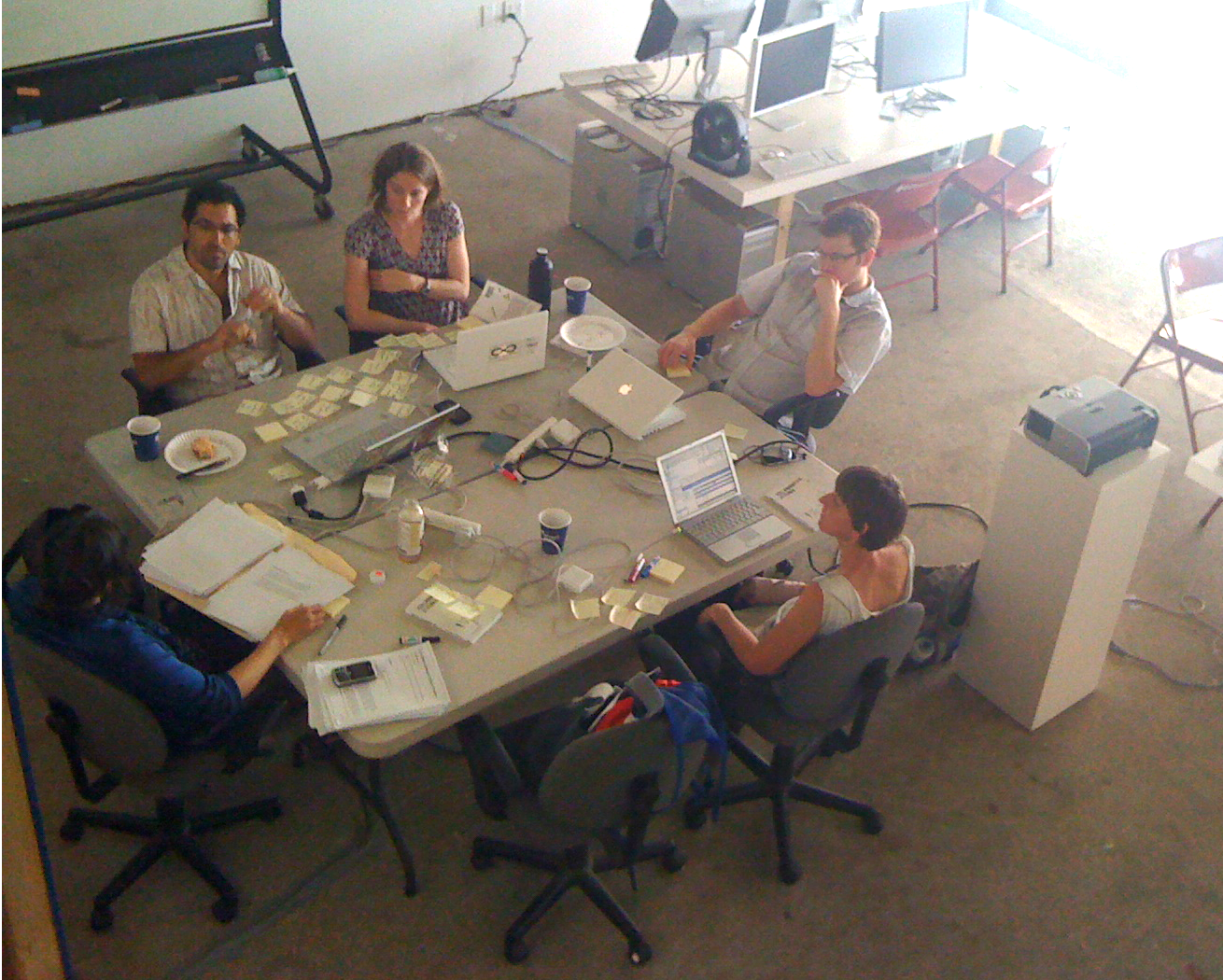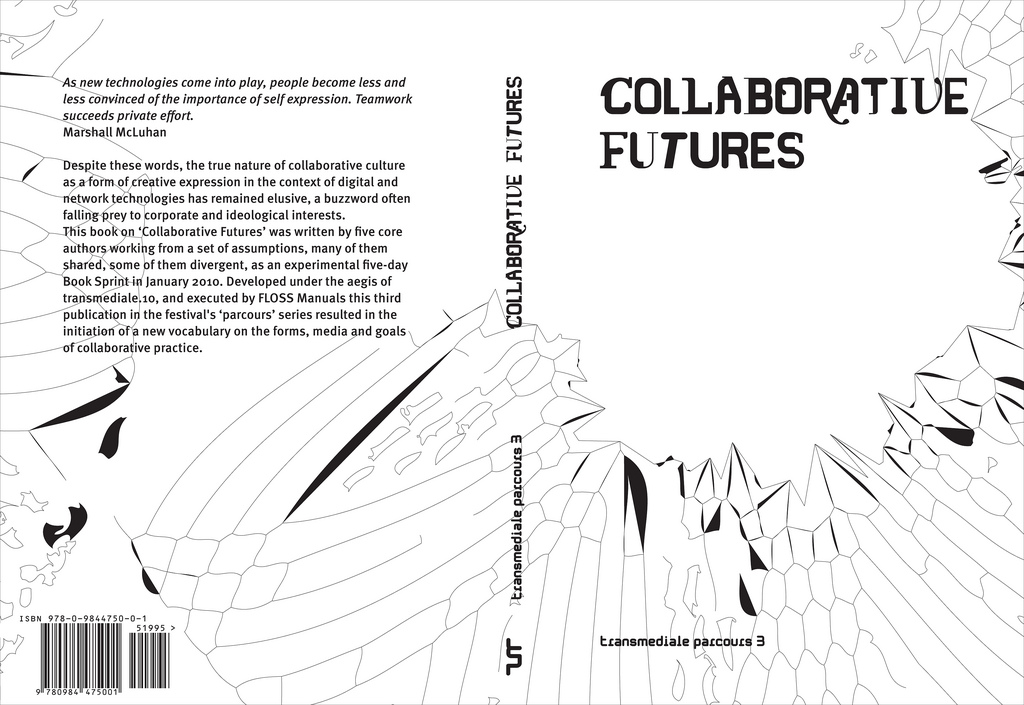Collaborative Futures Book Sprints I & II
“Collaboration on a book is the ultimate unnatural act.”
—Tom Clancy

This book was first written over 5 days (Jan 18-22, 2010) during a Book Sprint in Berlin. 7 people (5 writers, 1 programmer and 1 facilitator) gathered to collaborate and produce a book in 5 days with no prior preparation and with the only guiding light being the title ‘Collaborative Futures’.
These collaborators were: Mushon Zer-Aviv, Michael Mandiberg, Mike Linksvayer, Marta Peirano, Alan Toner, Aleksandar Erkalovic (programmer) and Adam Hyde (facilitator).
The event was part of the 2010 transmediale festival <https://transmediale.de/content/collaborative-futures-0>. 200 copies were printed the same week through a local print on demand service and distributed at the festival in Berlin. 100 copies were printed in New York later that month.
This book was revised, partially rewritten, and added to over three days in June 2010 during a second book sprint in New York, NY, at the Eyebeam Center for Art & Technology as part of the show Re:Group Beyond Models of Consensus and presented in conjunction with Not An Alternative and Upgrade NYC. Three new core members joined Mushon Zer-Aviv for the duration of the project in New York: Astra Taylor, kanarinka, and sissu. Michael Mandiberg, Mike Linksvayer, Alan Toner, Adam Hyde and Marta Peirano joined at various times in person and online.
Sprint 1
Day one consisted of presentations and discussions.
During this first day we relied heavily on traditional ‘unconference’ technologies—namely colored sticky notes. With reference to unconferences we always need to tip the hat to Allen Gunn and Aspiration for their inspirational execution of this format. We took many ideas from Aspiration’s Unconferences during the process of this sprint and we also brought much of what had been learned from previous Book Sprints to the table.

First, before the introductions, we each wrote as many notes as we could about what we thought this book was going to be about. The list consists of the following:
- When Collaboration Breaks.
- Collaboration (super) Models.
- Plausible near and long term development of collaboration tech, methods, etc. Social impact of the same. How social impact can be made positive. Dangers to look out for.
- Licenses cannot go two ways.
- Incriminating Collaborations.
- In the future much of what is valuable will be made by communities. What type of thing will they be? What rules will they have for participation? What can the social political consequences be?
- Sharing vs Collaboration.
- How to reconstruct and reassemble publishing?
- Collaboration and its relationship to FLOSS and GIT communities.
- What is collaboration? How does it differ from cooperation?
- What is the role of ego in collaboration?
- Attribution can kill collaboration as attribution = ownership.
- Sublimation of authorship and ego.
- Models of collaboration. Historical framework of collaboration. Influence of technology enabling collaboration.
- Successful free culture economic models.
Then each presented who they were and their ideas and projects as they are related to free culture, free software, and collaboration. The process was open to discussion and everyone was encouraged to write as many points, questions, statements, on sticky notes and put them on the wall. During this first day we wrote about 100 sticky notes with short statements like:
- “Art vs Collaboration”
- “Free Culture does not require maintenance”
- “Transparent premises”
- “Autonomy: better term than free/open?”
- “Centralized silos vs community”
- “Free Culture posturing”
…and other cryptic references to the thoughts of the day. We stuck these notes on a wall and after all of the presentations (and dinner) we grouped them under titles that seemed to act as appropriate meta tags. We then drew from these groups the 6 major themes. We finished at midnight.
Day two—10.00 kick off and we simply each chose a sticky note from one of the major themes and started writing. It was important for us to just ‘get in the flow’ and hence we wrote for the rest of the day until dinner. Then we went to the Turkish markets for burek, coffee and fresh Pomegranates.
The rest of the evening we re-aligned the index, smoothed it out, and identified a more linear structure. We finished up at about 23.00.
Day three—At 10.00 we started with a brief recap of the new index structure and then we also welcomed two new collaborators in the real-space: Mirko Lindner and Michelle Thorne. Later in the day, when Booki had been debugged a lot by Aco, we welcomed our first remote collaborator, Sophie Kampfrath. Then we wrote, and wrote a bit more. At the end of the day we restructured the first two sections, did a word count (17,000 words) and made sushi.

After sushi we argued about attribution and almost finished the first two sections. Closing time around midnight.
Day four—A late start (11.00) and we are also joined by Ela Kagel, one of the curators from Transmediale. Ela presented about herself and Transmediale and then we discussed possible ways Ela could contribute and we also discussed the larger structure of the book. Later Sophie joined us in real space to help edit and also Jon Cohrs came at dinner time to see how he could contribute. Word count at sleep time (22.00): 27,000.
Day five—The last day. We arrived at 10.00 and discussed the structure. Andrea Goetzke and Jon Cohrs joined us. We identified areas to be addressed, slightly altered the order of chapters, addressed the (now non-existent) processes section, and forged ahead. We finished 2200 on the button. Objavi, the publishing engine for Booki, generated a book-formatted PDF in 2 minutes. Done. Word count ~33,000.
Sprint 2
Over the course of the second book sprint we often paused to reflect on the fact that editing and altering an existing book (one originally written five months prior by a mostly different group of people) is a completely different challenge than the one tackled by the original sprinters. While the first author group began with nothing but two words -Collaborative Futures-, words that could not be changed but were chosen to inspire. This second time we started with 33,000 words that we needed to read, understand, interpret, position ourselves in relationship to, edit, transform, replace, expand upon, and refine.
Coming to a book that was already written, the second group’s ability to intervene in the text was clearly constrained. The book had a logic of its own, one relatively foreign to the new authors. We grappled with it, argued with it, chipped at it, and then began to add bits of ourselves. On the first day the new authors spent hours conversing with some of the original team. This continued on the second day, with collaborators challenging the original text and arguing with the new contributions.
We came to recognize, however, that the point was not to change the book so that it reflected our personal perspectives (whoever we are), but to collaborate with people who each have their own site of practice, ideology, speech, tools, agency. In service of a larger aim, none of us deleted the original text and replaced it to reflect our distinct point of view. Instead, we came to conceive of Collaborative Futures as a conversation. Since the text is designed to be malleable and modifiable, it aims to be an ongoing one. That said, at some point this iteration of the conversation has to stop if a book is to be generated and printed. A book can contain a documented conversation, but can it be a dynamic conversation? Or does the form we have chosen demand it become static and monolithic?
In the end, despite our differences, we agreed to contribute to the common cause, to become part of the multi-headed author. Whether that is a challenge to the book or a surrendering to it, remains unclear.
